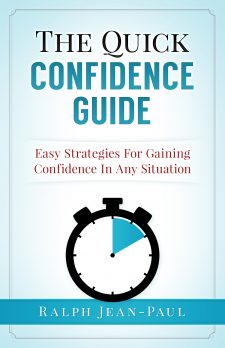03/06/2016
There are few things worse than being stuck in a job that you no longer want to do. Trust me, I know. In my case I worked for a large financial institution in a department where there was no opportunity for advancement.
Whether you seem to get passed up for every promotion or you work for a company where there seems to be no opportunity for growth, being stuck in one position too long and instead of growing in your career is like floating on a raft in the middle of the ocean.
In this post I will share with you a 4 year period in my life when I experienced accelerated career advancement. During that time, I was able to get promoted on average every 8 months. It may not be as easy as it sounds but I truly believe anyone can do this!
Like with many of my posts, this is going to be A LOT of information so bookmark or save it so that you can revisit this article later.
6 Promotions in 4 years
My rapid promotion journey started when I decided to leave a job that I’ve done for 8 years to transfer to another department within the company. The transfer was to an entry level position and people couldn’t understand why I would leave.
“Are you really leaving for an entry level position? You’re better than that”
My boss said walking into the room after reading my email that I was leaving. “Thanks, but I think it’s time I did something different”, I responded.
What my boss and others did not understand is that I did not intend on staying at the entry level for long. I intended on using every ounce of talent, skill, and energy I could muster to perform at my very best while working on the job.
Promotion #1 “Who’s the New Guy”
After leaving my last position, I was fired up to be in this entry level position. Primarily because I knew that there was so much opportunity there. It was a customer service position but required some selling.
Many of my new co-workers who had been there for years complained about the sales requirement. I, on the other hand, didn’t. Even though my last job had zero sales requirement. My first month on the new job, I led the office in sales. “Not a bad start.” I thought to myself when they announced the sales leaders..
I continued to lead the office in sales for 5 months.
Promotion #2 “I’m Just Not Used to Things Being So Efficient”
This promotion kind of caught me by surprise. I was only in the entry level position for 5 months before I was offered a Lead/Supervisor position. This position required me to supervise 7 other associates, take on new administration responsibilities, as well as keep up with my other everyday duties.
This position allowed me to flex my leadership muscles as well as use my previous operations experience to help run a smooth and efficient office.
One of the first days holding this position, my Manager asked me to give her a rundown of the staff members who were working overtime. The company was trying to avoid overtime for a short period in order to save money.
Instead of just giving her who was overtime, I also gave her how much time each associate was over, and drafted a short schedule that would allow us to be fully staffed for the rest of the week but allow all associates to leave without getting overtime.
When she got my results she called me right away and said that she was shocked. “Is there something wrong?”, I asked.
“No, she said I’m just not used to things being so efficient”.
Promotions #3 & 4 “You’ll be CEO in No Time”
“At this rate, you’ll be CEO in no time” a client joked with me after finding out about my 3rd promotion.
When a new Manager was hired, I had been in the Lead position for 3 months. She approached me about promoting me to another platform. I wasn’t sure if I wanted to do it since I had not expected another promotion for at least a year. By the 6th month I accepted the position and loved it.
This was a great position because I could use all of the skills I learned to help clients more. It also allowed me to build relationships with clients which included some successful business people and professional athletes.
About 9 months in that position a new manager was hired, and talk of me being promoted began. Not long after, it happened again.
In this position, I was responsible for selling specific financial products. Since there was a lot more involved, I spent a lot of time learning the benefits of each product and the kinds of clients that the products would be suitable. I consistently ranked in the top 5 of all 30 associates in the district in offering financial products.
A year into the position, my boss, who was happy about my progress, approached me about getting my investing license which I obtained.
Promotion #5 & 6 “Last Level and Moving On”
By the 5th promotion I was questioning my direction in the company. I wasn’t sure what I wanted to do next. Even though I loved my job and the people I worked with, my production goals didn’t seem challenging anymore. I had reached the highest level on this particular platform and I had to make a decision: Did I want to go back into leadership? Did I want to attempt another line of business? Less than 3 months into this promotion, the 6th promotion came knocking.
The 6th promotion wasn’t technically a promotion but it was step forward in the advancement of my career. I was recruited by another company that wanted me to come on and join their investment platform as an Investment Advisor. The job offered much more flexibility, I could work remotely, and it offered and opportunity to earn more. Hard to beat that.
Rapid Promotion
When I look back on the 4 year period it was kind of a blur. I like to think about all of my former co-workers that I laughed with daily. I like to think about all of the clients that thought of me as a trusted financial professional and friend.
One day, I was asked by someone in an entry level position what they could do to advance in their career. We had a 30 minute conversation and I helped her map out what she should be doing to advance. Below are some of the tips I shared and I hope they help you as well.
1. Attitude is (Almost) Everything
One of the things that people who advance quickly have in common is a good attitude along with excellent performance. Having a good attitude makes doing your job more enjoyable and allows you to see opportunities instead of problems. Attitude isn’t everything, you will have to execute in order to be taken seriously. But having a good attitude is the first step.
Here are some ways to make sure your attitude is in the right place:
Complain Less-When you complain about a situation, you miss the possible positives that can come out of the situation. Also, the last thing you want to be known for is dragging around negativity everywhere you go. Learn to keep complaints to yourself or, even better, turn negatives into positives.
Help First-One of the things I always tried to do was to be available to help co workers and clients. Seek to help first. Helping others reach their goals will help you in the long run. Your customers and clients will come back to you and your reputation of being a team player will spread among your co-workers.
Be Reliable– I wanted a reputation of being someone that could get the job done as well as someone you could count on to help. Having that reputation will help you stand out when your superiors are contemplating on who to promote next. Calling off or constantly coming in late will not get you a positive reputation.
Be Honest About Your Progress-Learn to evaluate your job performance honestly. Are you reaching the goals you set for yourself? Are you reaching the goals your employer has set for you? What can you do to excel in your performance? You should be able to answer these questions honestly.
2. Turn Pro
What I saw in many co-workers that I worked with was their hard work. However, one of the reasons why the promotions didn’t happen as fast for them was their unwillingness to go above and beyond what their position required. They were content with doing what was asked instead of excelling.
When we watch professional athletes play, it’s easy to forget how much effort it takes to reach that level of professionalism. NBA star Kobe Bryant, for example, has been an elite player his entire career. He is also known for having a tremendous work ethic.
In high school he would show up for practice by 5 am and would leave at 7 pm. As a professional, he trains for 4 hours a day and never leaves a practice until he shoots 400 shots. That is much more than what is required of him from his coaches. But that would explain why he was able to perform at a much higher level.
One of the things that I tried to do with every position I held, was to be an expert in that position. I wanted to know every compliance procedure, every answer to a question my staff had, and be completely knowledgeable when it came to the products we offered. That meant that I had to go above and beyond what was required of me. Since I was in finance, I studied different financial models, saving and investing strategies, and stayed current on events of the industry.
Begin to take your job seriously and focus on performing at a higher level. Become a student of your position and work at improving the skills you need to excel. Most likely that will mean doing more than what is expected of you. It may even mean practicing a sales pitch, process, or learning about a new product or procedure. And it may happen after work hours.
3. Learn Now for the Next Level
The company that hired me for promotion #6 needed someone in the position fairly quickly and I was thrown into the mix with only a week of training. Did I crumble? Nope. I knew it was an opportunity for me to advance more quickly. Since there was a void, I knew that if I could perform well sooner than later, it would open doors for the future.
Soon, the word spread to area Managers that I was the person to call on when a client had an investing need. As an Investment Advisor, my Senior partners were impressed by how quickly I was keeping up with the work load and expectations. One of them said “It took me 2 years to learn some of the things you know now”.
What they did not understand was that I was learning about how to be an Investment Advisor way before I even got my investing license. I would also spend time with a colleague of mine who was an Investment Advisor. He would tell me about the industry, his challenges with the job, and what expectations would be if I ever became one. That informal education made my transition easy.
Ask yourself what do you need to learn now for the next position you want. There is ALWAYS something you can learn in your current position that will help you in your next position, ALWAYS. Look closely and you’ll find something. Even the most routine and mundane jobs require some skill that, if applied correctly, can make a future position easier to do.
For example, my time in operations helped me become more efficient. Even though efficiency was not a huge requirement in my investing position, it helped tremendously because I processed paperwork faster and more accurately which saved me tons of time.
“Nothing is more expensive than a missed opportunity.”-H Jackson Brown Jr
4. Become Bigger Than Your Job
In my post How to Escape a Dead End Job, I spoke about something I called “out growing your pot”. The idea of outgrowing your pot is to become so skilled and proficient at your current position that you will become bigger than your job. Similar to a plant that has become bigger than the pot where it has been placed.
Here is an excerpt from my other post:
“If you’ve ever seen a plant that is growing larger than its pot, you may notice that the roots are desperately trying to stretch and expand. Sometime the roots will grow so large that they crack or break the pot that is now too small to contain the growing plant. This is the same approach you should have when trying to leave a dead end job.
As a person, you want to continually grow in skills, experience, and value. That growth will cause one of two things; a promotion because you have outgrown your current profession, or an opportunity to move on to another career that fits you. Just as a house plant that has grown too big to stay inside needs to be planted outdoors.”
5. Stay Ready for Opportunity
This was huge for me! Opportunities for advancement can happen when we least expect them. A manager at your job may find a job at another company, a supervisor may be fired or promoted or you may hear about a job elsewhere. Wherever the opportunity presents itself, be ready for it.
One of my friends and colleagues was interviewed for a position that I was also going to be interviewed for. He was intelligent, hard working and an all around nice guy. He had a similar background and experience as myself.
One of the only differences between us was that I had my investing licenses and he didn’t which was required for the position. A few years back, he had an opportunity to acquire that license but did not pursue it. I got the position because I was ready and he wasn’t.
This is probably one of the biggest keys to my rapid advancement. While many people were being passive about learning about a new product or process, I was jumping at the chance knowing that what I was learning and applying would prepare me for a future opportunity.
Get accustomed to being ready for a promotion even if there is not one in sight. This means learning, training, and acquiring everything you need for the next position you want.
6. Get Along With Others
You may be able to slam dunk your goals, show up early, and never miss a day of work. But if you are unable to get along with your co-workers and managers, you are going to have a hard time getting ahead.
I’ve come across many people that have complained about not getting promoted even though they work hard and deserve it. When I ask them about their relationship with their co-workers they tell me about all of the people they do not get along with. Not good.
You will spend more time with your co-workers than you will spend with your family and friends. So you might as well make them your friends or at least learn to work well with them. Getting along will not only help you get ahead, it will also make your working experience better.



 Subscribe for free today and get a FREE copy of my ebook The Path 2 Success. Begin your path today!
Subscribe for free today and get a FREE copy of my ebook The Path 2 Success. Begin your path today!










